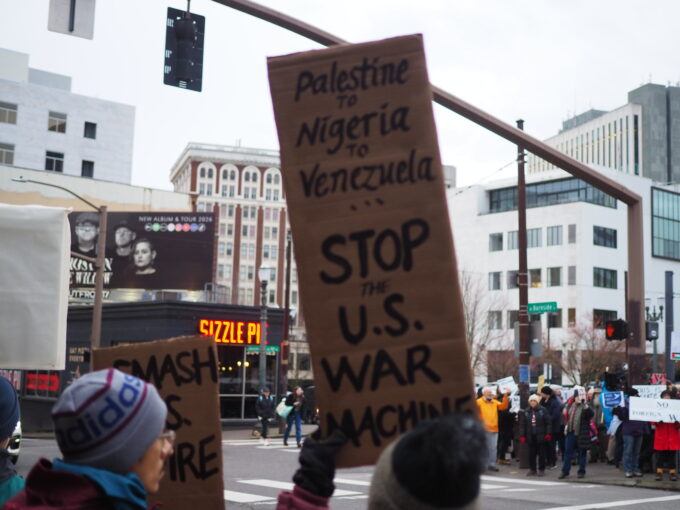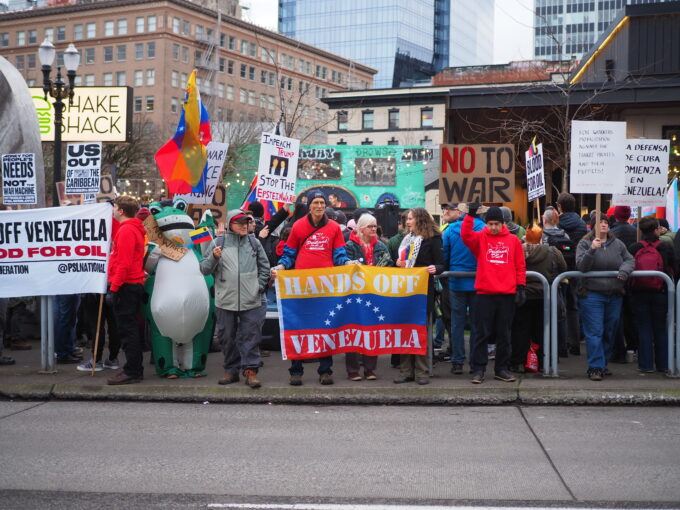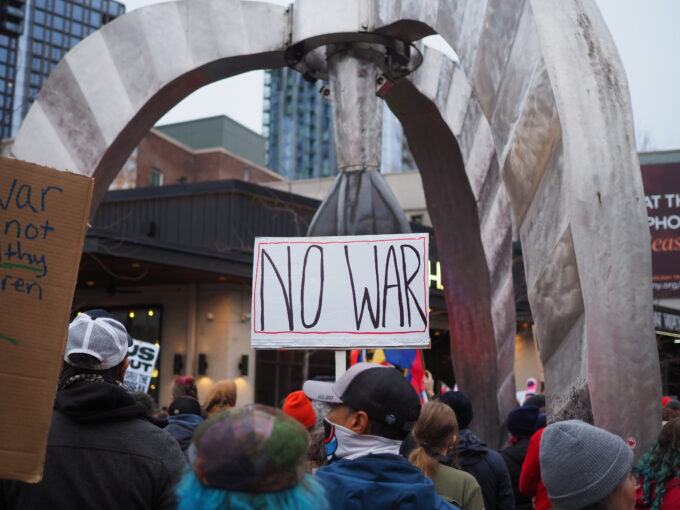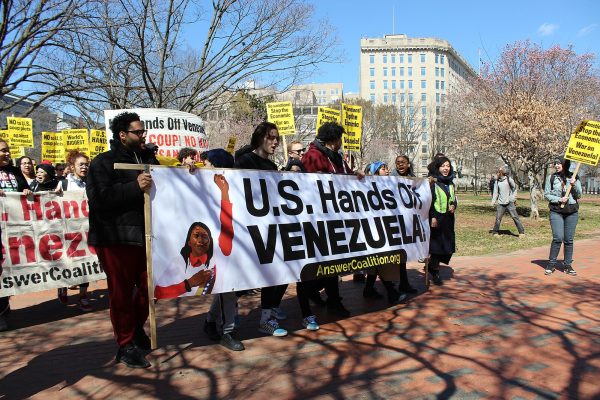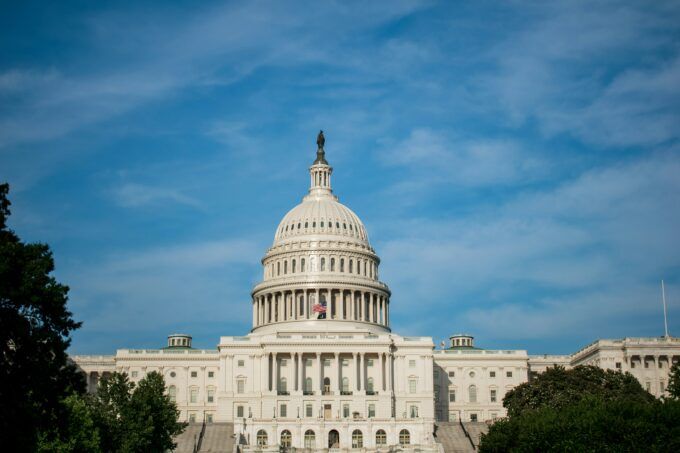
Image by Elijah Mears.
The elements behind Trump’s war on Venezuela are fourfold.
They center on the theft of Venezuela’s oil; the removal of Cuba’s primary lifeline; the protection of the dollar-based petrodollar; and Trump’s desperate need to deflect attention from the deepening quagmire that is the Epstein scandal.
And the ultimate question they raise is: will his blatantly illegal violation of U.S. and international law finally result in the impeachment and removal of Trump from the White House or the 2026 mid-term elections lead to an end of his destructive control of the U.S. government.
The lethal litany of reasons for Trump’s invasion is led by the U.S. seeking Venezuela’s huge reserves of oil—it supposedly has 303 billion barrels compared to the U.S. with but 45. After Venezuela is Saudi Arabia with 267 and Iran with 208 and then the list drops by 100.
“Venezuela unilaterally seized and sold American oil, American assets and American platform, costing us billions and billions of dollars,” said Trump after the U.S. struck Venezuela and captured its president, Nicolas Maduro, and his wife, and flew them to New York to be tried on drug charges. Venezuela “did this a while ago, but we never had a president that did anything about it. They took all of our property….The socialist regime stole it from us during those previous administrations.”
“Seizing a nation’s oil provides no legal basis for waging war or committing murder,” said David Swanson, executive director of the organization World BEYOND War as he announced a “Global Day of Action on January 17” named “No War on Venezuela.”
Swanson said: “We need to be protesting at every U.S. embassy the world over, at every state and local government in the United States, and in Washington D.C. in a manner to prevent the functioning of the Monrovian [for Monroe Doctrine] mafia.”
Swanson also said: “We can call it refreshing and exciting that Trump makes no pretense about hiding this motive. But ugly reasons for crimes don’t legalize them any more than beautiful ones.”
U.S. Senator Chris Van Hollen, a Maryland Democrat, on the “Face the Nation” TV program Sunday said that “you don’t invade a country to grab their resources….This, from the beginning, has been about getting rid of Maduro, grabbing Venezuela’s oil for American oil companies and Trump’s billionaire buddies. That’s what this is about. That’s why Donald Trump spent so much time yesterday talking about oil….They took out the leader, and now they’re demanding access to Venezuela’s oil. That’s what this has been about. I mean, Donald Trump, you know, claimed that he’d been against the war in Iraq from the beginning. That wasn’t true, but what we do know is he said, well, having gone into Iraq, we should have gotten their oil….I think it’s outrageous that the president of the United States puts American lives at risk so big American oil companies and his billionaire buddies can profit.”
As to eliminating the flow of oil from Venezuela to Cuba, this represents a high priority for the U.S. and especially Trump and Marco Rubio, his secretary of state and also national security advisor from a family that are exiles from Cuba.
As NBC News reported Sunday: “Just one day after the U.S. conducted a military operation that led to the capture of Venezuelan leader Nicolas Maduro and his wife, Secretary of State Marco Rubio reiterated a warning to Cuba, telling NBC News’ ‘Meet the Press’ that he thinks “they’re in a lot of trouble.”
“I’m not going to talk to you about what our future steps are going to be and our policies are going to be right now in this regard, Rubio said. But I don’t think it’s any mystery that we are not big bans of the Cuban regime, who, by the way, are the ones that were propping up Maduro.”
“Rubio’s latest remarks come after he and President Donald Trump signaled at a new conference Saturday that the administration could begin targeting Cuba’s government next, with the secretary of state issuing a stern warning to Cuban officials: ‘If I lived in Havana and I was in the government, I’d be concerned.’”
Then there is keeping the petrodollar U.S. dollar-based. “The Minority Report” ran a piece Sunday on Substack headed: “The Real Reason Why the U.S. Overthrew Venezuela. And why it all started in China in November 2025.”
The article explained:
“In November 2025, something extraordinary happened in Hong Kong that most people missed entirely….Chinese bonds began trading at ‘lower yields’ than United States Treasury bonds….In the hierarchy of global finance, this is roughly equivalent to a challenger brand outselling Coca-Cola at a higher price. It simply doesn’t happen. Until it did. One month later, the United States began mobilizing for potential intervention in Venezuela.”
“If you think these events are unrelated, you’re missing the most important geopolitical story of our generation. This is about the slow-motion collapse of the architecture that has supported American power for half a century: the dollar’s role as the world’s dominant reserve currency. And Venezuela, improbably, has become ground zero in the fight to preserve it….”
“Since the 1944 Bretton Woods agreement, and especially after the 1973 arrangement with Saudi Arabia that created the ‘petrodollar,’ the U.S, dollar has functioned as the world’s primary reserve currency. This status grants the United States an almost supernatural economic power. When you need dollars to buy oil, settle international debts, or participate in global trade, you create automatic demand for American currency…. More importantly, dollar dominance became America’s most powerful geopolitical weapon. Control the dollar system, and you control access to the global economy. Step out of line, and the United States can cut you off from SWIFT (the international banking communication network), freeze your reserves held in dollars, or impose sanctions that amount to economic excommunication….”
“Which brings us, inexorably, to Venezuela. On the surface, American interest in this South American nation might seem driven by concerns about authoritarianism or humanitarian crisis. Dig deeper, and you’ll find something more fundamental: Venezuela represents an existential threat to the petrodollar system, and by extension, to American global power itself.”
“Venezuela possesses the world’s largest proven oil reserves; 303 billion barrels….And since 2018, Venezuela has sold 100% of its oil exports to China, with transactions settled in yuan, not dollars. Moreover, Venezuela became an official BRICS+ partner nation in 2024, gaining access to the bloc’s alternative payment systems, development financing, and diplomatic protection.”
“Here’s what makes this particularly dangerous from Washington’s perspective: Venezuela isn’t just surviving outside the dollar system; it’s functioning. Despite what the U.S. Treasury Department characterizes as ‘unprecedented sanctions,’ Venezuela has maintained oil production, secured financing, and sustained trade relationships. It’s become a living, breathing advertisement that the dollar system is optional, not mandatory….”
“The timing of U.S. military mobilization; just one month after China’s Hong Kong bond proved the viability of dollar alternatives; is no accident. It’s the empire’s immune system responding to a pathogen it recognizes as lethal.”
Then there’s the “wag the dog” factor: Trump seeking to divert public attention from further disclosures about the Jeffrey Epstein scandal involving him—and doing it with military action. This message about the Venezuela situation and how people should “never underestimate what Trump will do to draw to draw attention from Jeffrey Epstein” is being delivered by the long-time Democratic political strategist James Carville.
“Wag the Dog” was the 1997 film, a political satire, centering on a spin doctor and a Hollywood producer fabricating a war in Albania to distract voters from a presidential sex scandal.
A corollary of that is the claim Saturday by former U.S. Transportation Secretary Peter Buttigieg on X about: “An unpopular president—failing on the economy and losing his grip on power at home—decides to launch a war for regime change abroad. The American people don’t want to ‘run’ a foreign country while our leaders fail to improve life in this one.”
Meanwhile, in an article in The New York Times, White House correspondents David E. Sanger and Tyler Page wrote about how Saturday Trump said that the U.S. planned to “’run’ Venezuela for an unspecified period, issuing orders to its government and exploiting its vast oil reserves.”
They wrote that Trump’s “actions on Saturday cast America back to a past era of gunboat diplomacy, when the United States used its military to grab territory and resources for its own benefit. A year ago this week, he openly mused, also at Mar-a-Lago, about making Canada, Greenland and Panama parts of the United States. Now, after hanging in the White House a portrait of William McKinley, the tariff-loving president who presided over the military seizure of the Philippines, Guam and Puerto Rico, Mr. Trump said it was well within the rights of the United States to wrest from Venezuela resources that he believes had been wrongly taken from the hands of American corporations. The U.S. operation, in seeking to assert control over a vast Latin American nation, has little precedent in recent decades, recalling the U.S. military efforts of the 19th and early 20th centuries in Mexico, Nicaragua and other countries.”
Meanwhile, the New York Review of Books published a piece Saturday by David Cole headed “Trump’s War” with a subhead: “The invasion of Venezuela is not law enforcement; it is imperialism, pure and simple.”
It began: “’It was a brilliant operation, actually.’ So claimed Donald Trump early this morning in a phone call with The New York Times about the US military’s overnight invasion and bombing of Venezuela, culminating in the abduction of Venezuelan president Nicolás Maduro and his wife, who have been brought to New York to face an indictment for drug smuggling.”
“It was an illegal operation, actually. Illegal on so many fronts that it can be challenging to keep them straight. First, and most importantly, it violates the bedrock rule of international law, which prohibits nations from attacking other sovereign states except when authorized by the UN itself or when acting in self-defense. Trump has invoked self-defense for all his aggressive actions against Venezuela, from summarily executing at least 115 people in unprovoked assaults from the air on boats alleged to be carrying drugs in international waters, to destroying a loading dock in the country itself and, now, bombing Caracas and abducting Maduro. The basis for that claim, Trump insists, is that Maduro has facilitated the smuggling of drugs into the United States, and that those drugs in turn kill thousands of Americans each year. But self-defense applies only in response to an actual or imminent armed attack, and whatever else drug smuggling might be, it is not even conceivably an armed attack. (According to US records, moreover, Venezuela is not even a source of fentanyl, the lethal drug that has been the agent of many of those overdose deaths and that Trump recently labeled a ‘weapon of mass destruction.” It mostly comes from Mexico.) Quite simply, Venezuela has not attacked the United States. The only nation with a self-defense justification here is Venezuela.”
The piece continued: “The attack also violated the U.S. Constitution, which gives Congress, not the president, the power to declare war and authorize the use of military force. The only situation in which presidents can constitutionally conduct unilateral military action is, again, in self-defense against an ongoing or imminent armed attack. The Venezuelan operation also violated the War Powers Resolution, which requires the president to notify Congress before introducing troops into any situation of ongoing or imminent hostilities.”
The question for the Congress, the people of the United States and the world now becomes: will this violation of all tenets of U.S. and international law finally lead to the removal of this madman from the White House?




